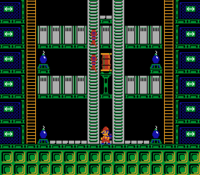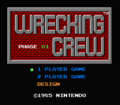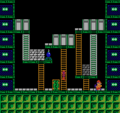Wrecking Crew
- This article is about the game for the Family Computer and Nintendo Entertainment System. For other uses, see Wrecking Crew (disambiguation).
| Wrecking Crew | |||||||||
|---|---|---|---|---|---|---|---|---|---|
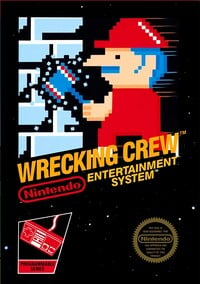 For alternate box art, see the game's gallery. | |||||||||
| Developer | Nintendo R&D 1 | ||||||||
| Publisher | Nintendo | ||||||||
| Platform(s) | Family Computer, Nintendo Entertainment System, Family Computer Disk System, Game Boy Advance, Virtual Console (Wii, 3DS, Wii U), Nintendo Entertainment System - Nintendo Switch Online | ||||||||
| Release date | Famicom/NES: Template:Release Family Computer Disk System: Template:Release Game Boy Advance: Template:Release Virtual Console (Wii): Template:Release Virtual Console (3DS) (Ambassador Program Release): Template:Release Virtual Console (3DS) (Full Release): Template:Release Virtual Console (Wii U): Template:Release Nintendo Entertainment System - Nintendo Switch Online: Template:Release | ||||||||
| Language(s) | English (United States) | ||||||||
| Genre | Puzzle, platformer | ||||||||
| Rating(s) |
| ||||||||
| Mode(s) | Single player, 1-2 players alternating | ||||||||
| Format | NES:
FDS:
Wii: Wii U: Nintendo Switch: Game Boy Advance: Nintendo 3DS: | ||||||||
| Input | NES:
Wii: Wii U: Nintendo Switch: Game Boy Advance: Nintendo 3DS:
| ||||||||
| Serial code(s) | HVC-WR (Japan) | ||||||||
Wrecking Crew is the second game and namesake installment of the series of the same name. It was released in 1985 for the Family Computer in Japan and later that year for the Nintendo Entertainment System in North America, eventually making it to Europe in 1987. Wrecking Crew was released on the Wii's, Nintendo 3DS's, and Wii U's Virtual Console, as well as for Nintendo Switch Online. It follows the VS. System version of the game called VS. Wrecking Crew which came out the previous year. In both games, the player controls Mario (Player 2 as Luigi) working on a demolition site. The goal is to break down all walls on each phase. However, this version is more focused on the puzzle platformer aspect and removed competitive play entirely as there is no simultaneous two-player mode.
Unlike the arcade version, this game also features a DESIGN mode, where players can make their own Wrecking Crew phases. The game had the ability to save those custom phases. However, the required peripherals (the keyboard and Data Recorder accessories) were released only in Japan, as the peripherals are only available in the Family BASIC accessory. The games Excitebike and Mach Rider have the same limitations as Wrecking Crew. This functionality was fully utilized in the Virtual Console rereleases of these games as they emulate the peripherals behind-the-scenes. However, this feature is not included in the Nintendo Switch Online version of the game. The Family Computer Disk System version does not need the peripherals as it could save on the disk.
A sequel to Wrecking Crew was released in 1998, Wrecking Crew '98, exclusively for the Super Famicom. Wrecking Crew '98 is competitive, giving each player their own side to clean up, and opportunity to send enemies to the opponent's side.
Gameplay
- See also: List of Wrecking Crew phases
Players can select any of the 100 phases to start on, excluding the Bonus Stages that come after every fourth phase. Unlike the arcade version, there is vertical scrolling but each phase still takes place in a single wraparound screen.
As the player tries to break all the walls with their hammer, they are attacked by various enemies. Defeating the enemies is not easy, as the regular hammer deals them no damage. If an enemy wanders underneath a drum, the player can trap it by causing the drum to fall. Sometimes Foreman Spike appears in the background and smashes walls himself. He can also try to push the player off the platforms, but if they can hit Foreman Spike with their hammer, Foreman Spike will fall down instead.
Doors appear less frequently than in the arcade original. Like the previous game, an enemy sent to the background screen becomes a harmless silhouette. If all enemies in a phase that contains more than one are sent to the background, they will freeze for around eight seconds.
If the player breaks down the walls in a particular order, they may find letters of the name of the character the player is playing. Finding all of these will give the player an extra life. In any phase with three or more dynamite, hitting three dynamite in a specific order will reveal a prize. The type of prize is determined by adding the phase number with the number of swings Mario made during the phase then dividing by 8. If the remainder is 0, 3, or 6, a pig statue is revealed which can be smashed for 800 points. If the remainder is 2 or 5, a Santa Claus statue worth 1600 points with show up. If it is 4 or 7, a maneki-neko statue worth 3200 points will appear. If the remainder is 1, it will spawn a Golden Hammer, also worth 3200 points. Much more powerful than the regular hammer, the Golden Hammer allows the player to knock down walls much faster, and, if they time it right, they can knock enemies down to the bottom floor.
As well as brick walls, there are also pillars that can be knocked out, ladder walls that can be used until they are destroyed (Foreman Spike can also destroy these), and dynamite that will damage any bricks lined up with it (as well as knocking whoever is nearby off the platform if they do not move away fast enough).
In the Bonus Stages, the player has to compete against Foreman Spike to find a coin hidden in a row of walls as the time counts down. 10,000 bonus points are awarded for finding it in the first wall that was smashed.
In 2 Player Game, one player will take over after the other loses a life. After completing all 100 phases, the game starts again from the beginning.
Characters
Playable
| Image | Name | Description
|
|---|---|---|
| Mario | The first player character, he is the only character playable in single-player mode. | |
| Luigi | The second player character, he is only playable in two-player mode. |
Enemies
| Image | Name | Description
|
|---|---|---|
| Gotchawrench | A dinosaur wrench that chases Mario around the phase. Red ones are slow, but purple ones are faster. | |
| Eggplant Man | A masked eggplant that sprints around, getting in Mario's way. | |
| Fireball | Spend too long in a particular area and a fireball will appear. | |
| Foreman Spike | The bearded foreman of the construction site. He will constantly try to stop Mario from completing his job by hitting the hero off the beams. He takes over the role Luigi did in the single player mode of the VS. version. |
Staff
- Game Designer
- Yoshio Sakamoto
- Makoto Kano
- Original Music
- Hirokazu Tanaka
- Sound Department
- Hirokazu Tanaka
- Director
- Producer
- Programed by
- Toshiyuki Nakamura
- Tomoyo-chan
- Yase Sobajima
- Akina-chan
Reception
| Reviews | |||
|---|---|---|---|
| Release | Reviewer, Publication | Score | Comment |
| Wii | Austin Shau, GameSpot | 7/10 | "For 500 Wii points, Wrecking Crew is a surprisingly fun game if you enjoy a good puzzler now and again. The presentation is uninteresting and you may be initially put off by its rigidity, but stick with it and you'll find yourself entertained by its brain-teasing level designs." |
| Wii | Lucas M. Thomas, IGN | 7/10 | "Puzzle fans should take new notice of Wrecking Crew now, even if they've avoided it before by thinking it's more of an action title. And if they did, it's not surprising – this game hasn't been properly presented in the past. But if gamers who loved Tetris, Bejeweled, Dr. Mario and Puzzle Quest jump on board and give this one a fair amount of downloads, we might also be blessed with its sequel." |
| Wii U | Stephen Kelly, Nintendo Life | 6/10 | "With so much competition out there, it's often hard to justify paying hard-earned cash for microscopic NES games of yesteryear. Nonetheless Wrecking Crew is an ambitious game, and even in the face of the occasional exhausting aggravation, this puzzle-platformer has a lot to offer. Although it paved the way for better projects to build on its foundation, Wrecking Crew still stands firmly cemented in Nintendo history." |
Gallery
- For this subject's image gallery, see Gallery:Wrecking Crew.
Media
- For a complete list of media for this subject, see List of Wrecking Crew media.
References to other games
- Mario Bros.: The fireball appears in phases if the player takes too long to complete the phase.
References in later media
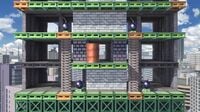
- Kid Icarus: Graphics designer Toru Osawa created the Eggplant Wizard in part as a tribute to the Eggplant Men, as well as his own love of eggplants.[1]
- Wrecking Crew '98: This game is a sequel to Wrecking Crew, a port of which is also included. All characters from the previous game are back.
- Super Smash Bros.: Mario's third color palette, with brown overalls and a white shirt, is said to be a reference to Foreman Spike.[2] This color option for Mario would return in all future installments. Also, Luigi's third color palette, with red overalls and a pink shirt is based on his sprite from the game.
- Mobile Golf: Foreman Spike reappears.
- Super Smash Bros. Melee: The Eggplant Man reappears as a collectible trophy. Mario's Foreman Spike-inspired color palette returns and Luigi's pink color palette returns.
- Chibi-Robo!: The Eggplant Man reappears again, this time under the name "Kid Eggplant."
- WarioWare: Twisted!: 9-Volt has a microgame based off Wrecking Crew simply titled Wrecking Crew.
- Dance Dance Revolution: Mario Mix: Waluigi's theme, "Destruction Dance", is an arrangement of the Bonus Stage music.
- Super Smash Bros. Brawl: The Golden Hammer and its theme are included in the game. Mario's Foreman Spike-inspired color palette returns and Luigi's pink color palette returns.
- WarioWare: D.I.Y. Showcase: 18-Volt has a microgame titled Wreck. Crew but some of its graphics are more similar to VS. Wrecking Crew.
- NES Remix: Several challenges are based on this game.
- Super Smash Bros. for Wii U: A Wrecking Crew stage appears in this game. Mario's Foreman Spike-inspired color palette returns and Luigi's pink color palette returns, alongside the Golden Hammer item.
- Super Mario Maker: Foreman Spike is one of the 100 Mario Costumes in the game and also several jingles are also heard from this game when playing as him.
- WarioWare Gold: One of 9-Volt's microgames in this game is based on Wrecking Crew.
- Super Smash Bros. Ultimate: The Golden Hammer from Wrecking Crew and the Wrecking Crew stage return in this game. Mario's Foreman Spike-inspired color and Luigi's pink color palette also return.
- The Super Mario Bros. Movie: Spike reappears as Mario and Luigi's former boss. His outfit also has the name "Wrecking Crew" on his hat and left sleeve.
Names in other languages
| Language | Name | Meaning | Notes |
|---|---|---|---|
| Japanese | レッキングクルー[?] Rekkingu Kurū |
Wrecking Crew |
References
- ^ Monnens, Devin (March 19, 2012). Making of a Myth: The Grueling Development of the Original Kid Icarus. Nintendo World Report. Retrieved April 4, 2015. (Archived May 2, 2014, 00:50:53 UTC via Wayback Machine.)
- ^ 「(ブラッキー色:FCレッキングクルー) (Blackey - FC Wrecking Crew)」– 色ちがいのひみつ. Nintendo (Japanese). Retrieved April 4, 2015.
| VS. Wrecking Crew / Wrecking Crew | |
|---|---|
| Characters | Mario • Luigi |
| Items and objects | Coin • Door • Druma • Dynamite • Floor • Golden Hammera • Ladder (Ladder wall) • Lettera • Pillara • Wall |
| Enemies | Eggplant Mana • Fireball • Foreman Spikea • Gotchawrench |
| Phases | VS. Wrecking Crew • Wrecking Crewa |
